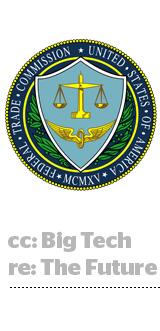
Far from Silicon Valley, in a lecture hall at George Washington University Law School on an overcast day in Washington, DC, the clouds are gathering for big tech.
On Thursday, the Federal Trade Commission held the first in a series of public hearings running from now through November focused on a wide range of consumer protection and competition-related topics, including privacy regulation and an examination of vertical mergers.
These hearings could shape the FTC’s enforcement agenda for years to come, particularly how it thinks about dealing with the tech sector.
“The goal is to understand if our current enforcement policies are on the right track or the wrong track – and if they’re on the wrong track, what can we do to fix them,” said newly minted FTC Chairman Joseph Simons, kicking off the event Thursday.
The FTC is soliciting advice on how and where to focus its attention in part because technology is almost unrecognizable from 1995, the last time the FTC held a similar series of public discussions, dubbed the Pitofsky hearings after then-chairman Robert Pitofsky.
The Pitosky hearings, which resulted in a report the following year, guided FTC policy for the next two decades on everything from consumer protection to data collection to cybersecurity. The report also laid out the agency’s support of consumer education and self-regulation as preferable to legislation, notions the advertising industry have hung their hat on for years.
But in 1995, Myspace hadn’t even been founded yet and Internet Explorer was the top web browser. Although change is needed, the FTC has to decide how to prioritize its enforcement efforts given its finite resources.
Alysa Hutnik, a partner in the advertising/marketing and privacy/information security practices at Kelley Drye & Warren LLP, says the FTC should focus on business practices that cause real harm.
Identifying what those practices are, though, is extremely difficult due to competition and antitrust issues – and the fact that bigness doesn’t always mean badness, said Jason Furman, a professor of economic policy at Harvard University’s Kennedy School of Government.
In the retail sector where Walmart and Amazon dominate, Furman said, the consumer can benefit with better pricing and more efficient access to products.
Yet, the FTC must try to ensure fairness in the digital economy, where algorithms reign and variable pricing and offers are the norm. At the same time, it also has to gauge the harm when a platform like Facebook can be used to exclude sectors of the population from seeing certain job ads because of their age. The question of harm or unfairness isn’t always quantifiable in terms of price.
“Automated decision-making provides all sorts of challenges for regulators – it’s a black-box system,” said David Vladek, a professor of law at Georgetown University Law Center and a former director of the FTC’s Bureau of Consumer Protection. “You can’t interrogate an algorithm.”
But you can interrogate a process, which is what the FTC will be doing from now until at least November with its hearings. And just like more than 20 years ago, the industry should expect a definitive report, possibly in a year or so, that gives guidance on the FTC’s priorities and provides a blueprint for the foreseeable.
The FTC isn’t out for gotcha enforcement or to break up big tech on principle – busting up the platforms isn’t necessarily desirable or feasible – but companies like Facebook and Google should be keeping their ears pricked to the conversations coming out of DC right now.
“Technology plans an integral part in the consumer experience,” Hutnik said. “It’s no surprise why technology plays such a key role in the FTC’s enforcement cases.”
This post was syndicated from Ad Exchanger.


More Stories
The One Show AI judge Sherina Florence releases hip-hop album for deadline push
Week of Feb. 17 Cable News Ratings: Fox News and CNN Make Primetime Gains
AppLovin is Officially the New Target of Short Sellers